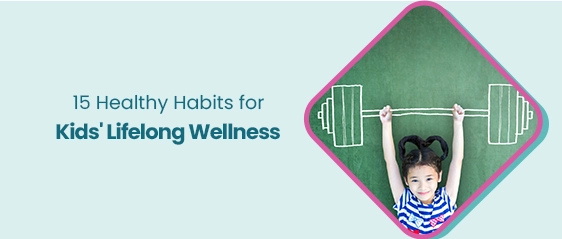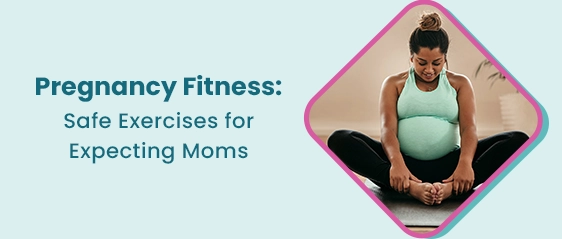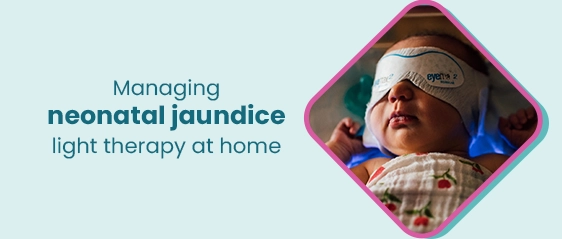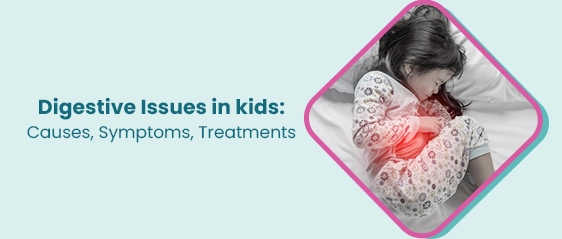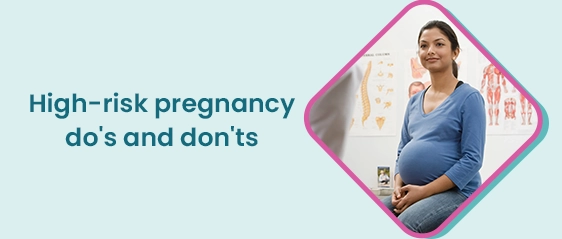
High-risk pregnancy do's and don'ts
- 14 Aug 2023
Bringing a new life into the world is a joyous and transformative experience. However, for some expectant mothers, the journey can be more complex due to a high-risk pregnancy. A high-risk pregnancy involves factors that may increase the likelihood of complications for both the mother and the baby. While it can be a challenging path, armed with the right knowledge and guidance, many women successfully navigate high-risk pregnancies. In this blog, we'll explore the essential do's and don'ts to help you navigate a high-risk pregnancy with confidence.
The Do's
Partner with a Specialist
A vital action to effectively manage a high-risk pregnancy involves teaming up with a healthcare professional specializing in high-risk obstetrics. These specialists possess in-depth knowledge of intricate aspects in complex pregnancies and are skilled in monitoring and addressing potential complications. As soon as you confirm your pregnancy, look for the best women & child hospital having the best doctors who comprehends your individual situation and can offer the specialized attention your circumstances demand.
Stay Informed
Having knowledge on your side is incredibly valuable throughout this journey. Take the time to learn about your specific condition and its potential impact on your pregnancy. Grasping the risks, potential issues, and various situations equips you to make well-informed choices about your care. Being well-versed also enables you to actively engage in conversations with your healthcare provider, ensuring you're a proactive participant in your own healthcare journey.
Regular Prenatal Visits
Regular prenatal care is a cornerstone of managing a high-risk pregnancy. Attending all recommended prenatal appointments is crucial as they allow your healthcare provider to closely monitor your condition and the progress of your baby's development. These visits provide opportunities to detect any potential issues early, and your provider can make adjustments to your care plan as needed to ensure the best possible outcome for you and your baby.
Follow Medical Advice
The guidance given by your healthcare provider is personalized to guarantee your safety and the health of your baby. Whether it involves medications, changes in how you live, or adjustments to your diet, following your provider's instructions is extremely crucial. It's important to resist the urge to self-treat or base decisions on stories you've heard, as your provider's specialized knowledge is indispensable when it comes to handling the intricacies of your high-risk pregnancy.
Maintain a Healthy Lifestyle
While this advice holds true for all pregnancies, it's especially important for high-risk pregnancies. Focus on a balanced diet rich in essential nutrients, engage in approved physical activities that promote circulation and overall well-being, and ensure you're getting adequate rest. Equally important is what you choose to avoid – steer clear of smoking, alcohol, and recreational drugs, as they can further complicate an already delicate situation.
Manage Stress
Pregnancy itself can be a stressful time, and a high-risk pregnancy can amplify those feelings. High stress levels can impact both your health and your baby's development. Engage in relaxation techniques like meditation, deep breathing exercises, and prenatal yoga to manage stress effectively. Connecting with support groups or seeking counseling can also provide an outlet for expressing your concerns and receiving emotional support.
Communicate Openly
Open and effective communication with your healthcare provider is vital. Make sure to promptly communicate any worries, symptoms, or changes you observe. Feel free to ask questions or request explanations about any part of your care. Keeping the lines of communication open ensures that both you and your provider are in sync and collaborating to achieve the best possible result.
The Don'ts
Don't Miss Appointments
Skipping prenatal visits is never a good idea, especially during a high-risk pregnancy. These visits are carefully timed to monitor your health and the progress of your baby. Missing appointments could lead to missed opportunities for monitoring and addressing potential complications early on.
Avoid Self-Medication
Self-medication can have serious consequences, especially in a high-risk pregnancy. Never take any medications, including over-the-counter drugs, without consulting your healthcare provider. Certain medications might be unsafe for your specific condition and could potentially harm you or your baby.
Say No to Risky Activities
While staying active is important, it's equally crucial to avoid activities with a potential for injury. Strenuous exercises or activities that may cause falls could put both you and your baby at risk. Opt for safe and approved physical activities that promote well-being without unnecessary risks.
Limit Caffeine and Processed Foods
While it's essential to keep a balanced diet, pay attention to how much caffeine you consume and the amount of processed foods you eat. Consuming too much caffeine can cause your heart rate to rise and may lead to potential issues, while processed foods often lack valuable nutrients. Instead, direct your attention toward whole foods that provide nourishment for your body and contribute to your baby's healthy growth.
Don't Neglect Warning Signs
If you notice signs such as intense belly pain, bleeding from the vagina, unexpected swelling, or any unusual feelings, don't wait – reach out to a healthcare professional right away. These signals might suggest possible issues that require immediate assessment and action.
Avoid Stressful Environments
Chronic stress can negatively impact your well-being and potentially affect your baby's development. Whenever possible, minimize exposure to stressful situations. This might involve making adjustments in your work environment, personal relationships, or daily routine to prioritize your emotional well-being.
Don't Be Afraid to Ask Questions
Your healthcare provider is there to support you, and that includes answering any questions or concerns you might have. Avoid hesitating to ask questions or express any worries you're experiencing. Clear and open communication is essential for your peace of mind and for ensuring that you have a comprehensive understanding of your care.
Frequently Asked Questions
1.Is walking good for high-risk pregnancy?
For some moms-to-be with high-risk pregnancies, walking can be good. But, before you start exercising, talk to your doctor first. They know what's best and safe for you and your baby
2.What are 10 high-risk pregnancy conditions?
There are various high-risk pregnancy conditions, including gestational diabetes, preeclampsia, placenta previa, preterm labor, multiple pregnancies (twins, triplets, etc.), maternal age over 35, history of preterm birth, chronic hypertension, placental abruption, and certain medical conditions like heart disease or kidney problems.
3.What are signs of high-risk pregnancy?
Signs of a high-risk pregnancy can include bleeding, severe abdominal pain, persistent headaches, high blood pressure, rapid weight gain, decreased fetal movement, and more. It's crucial to discuss any unusual symptoms with your healthcare provider.
4.Is high-risk pregnancy bad?
Having a high-risk pregnancy means there could be things that might make things harder, but it doesn't mean everything will be bad. With good medical care and attention, things can get better, and both the mom and the baby can have a good result.
5.What age is a high-risk pregnancy?
While there's no universally defined age, pregnancy after the age of 35 is generally considered advanced maternal age and may be classified as a high-risk pregnancy due to the increased likelihood of certain complications.
6. Does high-risk pregnancy mean bed rest?
Not necessarily. Bed rest used to be a common recommendation, but current medical practice focuses on tailored approaches. Bed rest might be advised in certain cases, but many high-risk pregnancies can be managed with other strategies.
7.Is bending safe during pregnancy?
Bending is usually safe during pregnancy. However, as your pregnancy progresses, you might find it more comfortable to bend at the knees and hips to avoid putting too much strain on your back.
8.How to sleep during pregnancy?
As your pregnancy advances, sleeping on your side (preferably the left side) with a pillow between your knees for support is often recommended. This position improves blood flow and takes pressure off major blood vessels.
9.What is an unhealthy lifestyle during pregnancy?
An unhealthy lifestyle during pregnancy includes smoking, excessive alcohol consumption, illicit drug use, poor nutrition, lack of exercise, inadequate sleep, and high stress levels.
10.How many hours should a pregnant woman sleep?
Pregnant women should aim for 7 to 9 hours of quality sleep per night. Adequate sleep is important for both maternal and fetal well-being.
11.What if I accidentally slept on my back while pregnant?
While it's generally recommended to sleep on your side during the later stages of pregnancy, the occasional unintentional back sleeping is unlikely to cause harm. Simply adjust your position if you wake up on your back.
12.Which week of pregnancy is the most tiring?
The first trimester and the third trimester are often considered the most tiring periods of pregnancy. During the first trimester, your body is adjusting to hormonal changes, and in the third trimester, the growing baby can affect your sleep and energy levels.
13.How much water should a pregnant woman drink?
Staying hydrated is important. Aim for about 8 to 10 glasses (around 2.3 liters) of water per day during pregnancy. Adjust based on your activity level and any specific recommendations from your healthcare provider.
